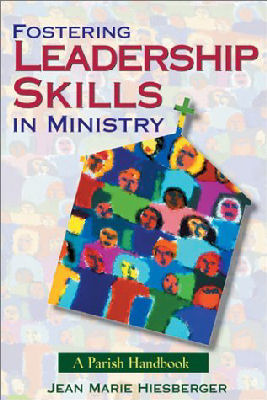
|
Posted May 9, 2006
Book: Fostering Leadership Skills in Ministry: A Parish Handbook Author: Jean Marie Hiesberger Liguori, Missouri, 2003. Pp. 120 An Excerpt from the Jacket:
Now parish leaders – pastors, pastoral administrators, parish council members, associate pastors and pastoral ministers, principals, directors of religious education, and volunteer coordinators, whether salaried or volunteer – have guide for developing and fostering a leadership style based on Jesus’ qualities of listening and responding to others; creating a vision; being authentic and compassionate; forgiving others; being straightforward and generative; being inclusive, especially of those who are alienated and marginalized; empowering others; and being a person of integrity. Fostering Leadership Skills for Ministry offers practical suggestions and examples to help parish leaders: – Develop a real sense of community in the parish – Draft effective parish mission statements – Build effective small Christian communities – Develop vibrant parish councils – Recruit, train, and support volunteers – Deal and resolve conflict – Plan and facilitate productive parish meetings – Make effective group decisions – Deal with inevitable change and transition. An Excerpt from the Book: Dealing With Conflict and Anger: Danger and Opportunity “You do not lead by hitting people over the head — that’s assault, not leadership — Dwight D. Eisenhower In a recent survey, pastors said that the major skill parish workers need help with is dealing with conflict and anger. While this survey result isn’t surprising, it does underline the fact that conflict is a part of ordinary life, whether in the family, the workplace, the community, or the Church. Conflict exists because we are not all the same – and for that, we are grateful to God! How boring and uninteresting would life be otherwise. The Chinese symbol for conflict is a combination of two Chinese words: danger and opportunity. This symbol provides a neutral label for conflict: conflict can be either positive or negative. Sometimes the most creative ideas and solutions to problems come out of talking through varying positions and viewpoints. Conflict can be an opportunity to better understand another person. Yet, the very same situation can result in people digging in their heels and labeling others negatively — or worse — in respect to any future interactions. Conflict has possibilities in either direction. Everything depends, of course, on how it is handled? What Is Conflict? What Is Anger? Conflict might be defined as a battle, a disagreement, a difference of opinion or ideas, a misunderstanding. Thank about how you would define the word “conflict.” Whether it’s between parish staff members, among parishioners, or within the family, neighborhood, or workplace, conflict most often centers around a difference of opinion – differences that are not always negative, but negative differences of opinion are often those that stand out most clearly in our minds. Table of Contents: 1. Jesus as servant-leader: becoming one of them to lead them 2. The person of the leader: what is inside 3. Planning together: bringing about the kingdom of God 4. Community building: Christian community as heart of parish 5. Enabling small groups: connecting individuals 6. Parish pastoral council: a leadership community 7. Volunteers: responding to the baptismal call 8. Dealing with conflict and anger: danger and opportunity 9. How to run a meeting: toward positive and productive events 10. Change and transition: dealing with the inevitable 11. Self-care and personal development of the minister: striking a balance |
|
